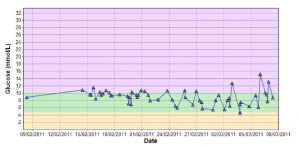This is a general update about my health and medication. Hey, it’s my blog so I can do that! Feel free to skip it if you want.
I’m currently suffering from:
- ME
- Migraines
- Diabetes
- Restless Legs
- Depression
- Neuropathic pain of unknown cause
- Other random stuff
Just after the new year I had a massive relapse. I was overwhelmed by pain and fatigue, and I ended up stuck in bed almost all of the time. My blood sugar spiralled out of control, and my optician found retinopathy in my right eye, which means my diabetes is getting serious.
I have tried all sorts of pain medication in the past, mostly finding it ineffective or getting too many side effects from it. For the last couple of years I had only been taking paracetamol and codeine for the pain. Recently my pain has been on a whole new level and of new types so last month my doctor gave me naproxen to try and stop the burning neuropathic pain, as well as co-dydramol for the muscle aches and cramp-like and stabbing pains. I was actually a bit miffed about the co-dydramol because she gave me 10/500 tablets (10mg dihydrocodeine and 500mg paracetamol) whereas previously I had separate codeine and paracetamol so that I could use only paracetamol if that was all I needed, and then take codeine later in whatever amount I required at the time.
The naproxen took the edge off the pain, but not enough so I recently started taking pregabalin. Despite the horror stories and huge list of side effects it has actually turned out very well so far. In my first few days on it I was drowsy, dizzy, and had no balance, but that has all settled down now. I’m getting a lot of pain relief from it, and I actually seem to have more energy too! I’ve also got seperate codeine tablets again. My current cocktail of naproxen, paracetamol, codeine, and pregabalin takes most of my pain away. I still hurt after waking up until my morning tablets start working, and I still get aching and occasional slight burning but things are much better now.
My pain is now at a low enough level that I can start to function again. That is, the level that I am used to putting up with for the last few years where I have had reasonably good health. (About 80 - 90% of normal functioning.) Today my doctor and I decided against increasing any medicine for fear of bringing on side effects. Having said that, I am about to start duloxetine for my depression, and that can also treat neuropathic pain so things might improve a little bit more.
So now that I am not crying at the pain all the time, and I have also found a little bit of energy, I am able to spend a few hours out of bed on most days. I usually waste this on sitting at my desk to use my computer. (The netbooks that I use in bed are sloooooow!) The problem is that I have forgotten how to pace myself, so every time I feel OK I do too much and stay out of bed too long, so that the next day I suffer the consequences and end up too tired to get out of bed and in more pain. I’ve got a huge pile of notes on pacing from a few years ago and a new book that I need to read, then back to trying to have a routine of eating, resting, and activity at the right times. I find that very difficult.
The other problem that I have to sort out is my diabetes. I have only had it for two and a half years, but in that time I have progressed to the maximum dose of metformin and gliclazide and still don’t have my blood glucose under control. Every time I step up a drug or get stricter on my diet things get a bit better but deteriorate rapidly. Here’s my last month of blood sugar readings.
The next step from here could be a new medicine in addition to the two that I already take, or insulin injections. My doctor is of the opinion that the rapid progression of my diabetes means that I would be better off going straight to insulin. She explained to me that the earlier the onset of type 2 diabetes, the faster the progression seemed to be. She mentioned people in their 30s and 40s for this example. I had to point out that I was diagnosed the day before my 30th birthday, and so actually I became diabetic in my 20s which probably makes me one of the youngest people to get type 2 diabetes. I have been against the idea of taking insulin because I really want to train up and ride blood bikes and I think taking insulin would be a problem but I think at this point I have to accept that my health problems mean that I will never do that. With that ambition crushed, I might as well start insulin and have an easier time of it. As it stands, my doctor is going to wait until my next diabetes check up in just under three months, and if things aren’t under control then, I will be referred to a specialist to start taking insulin.
So that’s me at the moment. Some improvements, some deterioration. My diabetes is far worse and going downhill fast and taking my ambitions with it. My pain is down, although still probably what most people would rate as high, and my depression will be treated. As consollation prize at least I can get out of bed occasionally now.


